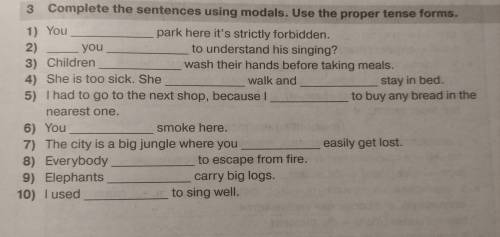, нужен точный и правильный ответ

Другие вопросы по теме Английский язык
Популярные вопросы
- КРАТКО если можно1. Виды механического движения. Уравнения движения.2. Силы...
3 - Рассчитайте процентную концентрацию раствора содержащего 36 г вещества в 212...
2 - Вычислите значение производной функции f(x) = -5x^9-2x^6=+7x^2+7x в точке...
1 - Помилку про творенні дієслівних форм допущено в рядку: До ть, будь ласка,...
3 - Fe + Cl2 - FeCl3 С остальными галогенами подучится так же?...
1 - Знайдіть координати вектора АВ,якщо А(-4;3;9),В(5;-2;0)...
3 - Напишите молекулярное, полное и сокращенное ионное уравнение BaCl2+HOH=...
3 - А =(3;-2;-2) b=(1;-2). Вычислит векторное...
1 - с заданием см.ниже фото прикреплено с заданием см.ниже фото прикреплено >...
1 - Какое число должно заменить во знак? 17 3 20 25 17 ? ОБЪЯСНИТЬ ПОЧЕМУ!...
3
1)You CANNOT park here it’s strictly forbidden.
2) CAN you TRY to understand his singing?
3)Children MUST wash their hands before taking meals.
4)She is too sick. She CANNOT walk and MUST stay in bed.
5)I had to go to the next shop, because I COULD NOT buy any bread in the nearest one.
6)You CANNOT smoke here.
7) The city is a big jungle where you CAN easily get lost.
8) Everybody OUGHT TO to escape from fire.
9) Elephants CAN carry big logs.
10) I used to sing well.
Explanation:
A modal verb is an auxiliary or supporting verb that is used to support the main verb in a sentence.
Some examples of modal verbs include can, could, may, might, will (shall), would, should, must and ought.